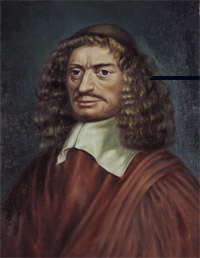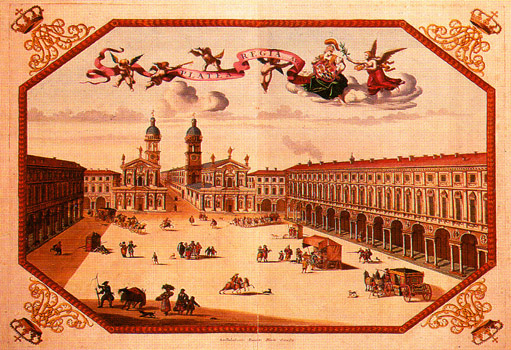Giacomo Carissimi, born in Marini
near Rome, was the youngest child of an artisan and grew up
against the background of religious reform in Europe. A member of
the Tivoli cathedral choir and an organist there until 1627, he
found his real niche at the Collegio Germanico in Rome. This was a
leading centre of Jesuit teaching. The Jesuits at that time had a
particular influence in strengthening the Catholic Church through
a programme of education and missionary work. Carissimi became
Maestro di Cappella in 1629; during his service, the talent of the
young
composer fused with the energies and objectives of the
Jesuit
order. Despite invitations to serve the Governor or the
Netherlands in Brussels, and the chance to follow in Monteverdi's
footsteps at St Mark's, Venice, in 1643, Carissitni elected to
continue his work with the Jesuits. He remained in Rome all his
life, dedicating himself to the development of the boys' choir, to
the general students, and to the musical output of the college and
its associated church Sant' Apollinare.
Canssimi became the teacher of many other composers and gained
a reputation throughout Europe. His main areas of musical interest
as a composer were the cantata and the oratorio. His cantatas,
such as A pie d'un verdee
allow, written around
1650, were strongly influenced by Luigi Rossi's work earlier m the
centurv, and in
many of these works he experimented with varying approaches to
arias. His work with oratorios was seminal and can be said to have
helped to create this musical form — even it its actual name
emerged only later. In works such as Jephtc, Jonas, and
Baltazar Carissimi drew on Old Testament texts and used a
narrative voice, divided among several singers, to tell the story.
He also used choruses, whether for dramatic, narrative, or
meditative purposes, as an integral part of the works.
Regrettably, much of Canssimi's work exists only in copied form
— most of his original manuscripts were lost after the dissolution
of the Jesuit order in 1773. However, his influence notably
pervaded the thinking of several other composers. The works of
Charpentier, who studied under Carissimi in the 1 650s, and
Handel, whose oratorios Samson and Alexander's feast
bear certain similarities to Carissimi's Jephte, confirm
Carissimi's status as one of Italy's most influential
seventeenth-century composers.
|



No comments:
Post a Comment